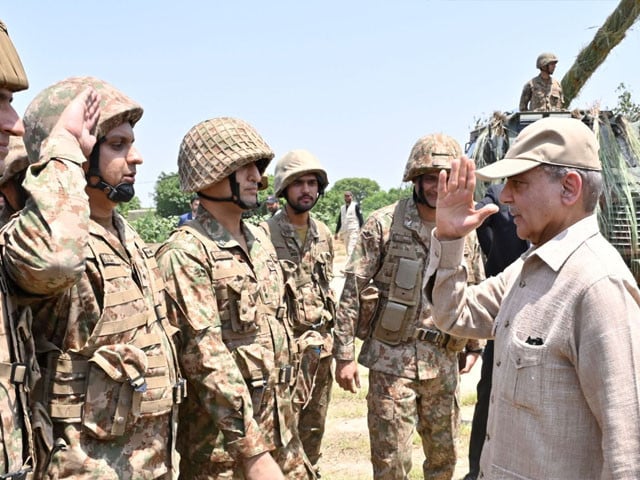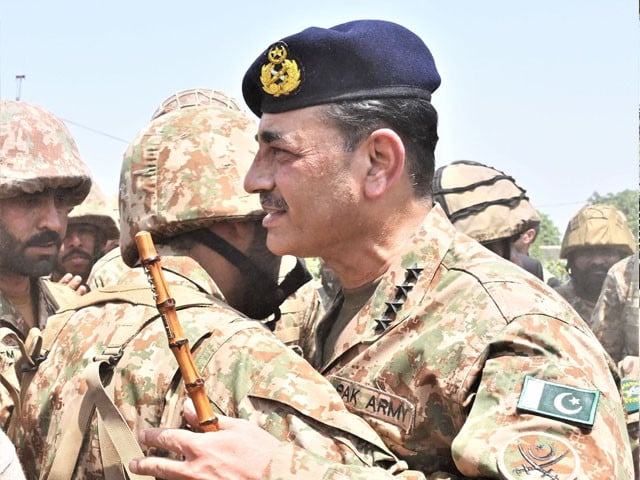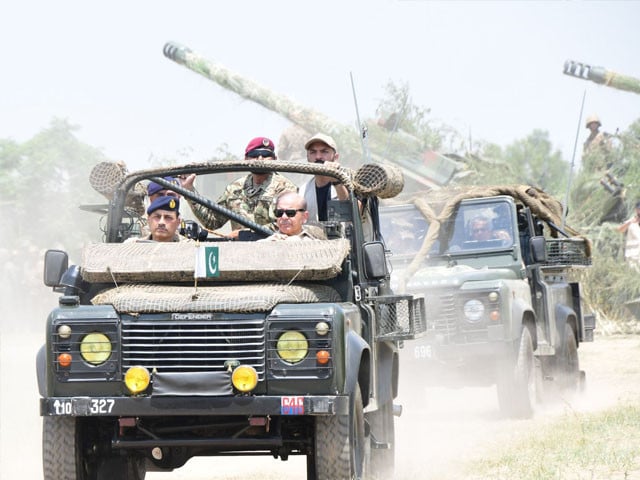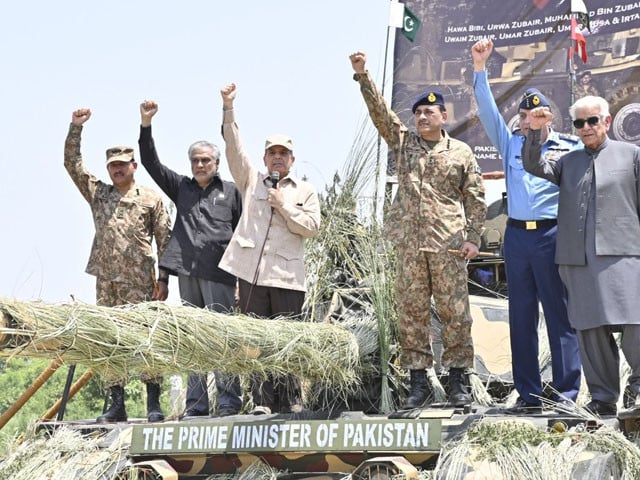Prime Minister Shehbaz Sharif on Wednesday declared that Pakistani forces had “avenged 1971” as he addressed officers and soldiers at the frontline Pasrur Garrison in Sialkot, a key operational hub for Operation Bunyanum Marsoos.
His comments came during a high-profile visit alongside Chief of Army Staff General Syed Asim Munir and Air Chief Marshal Zaheer Ahmad Babar Sidhu.
“You have avenged 1971,” Shehbaz said to the assembled troops. “I salute every officer here today for defending Pakistan’s honour with unmatched courage.” He praised the armed forces for their coordinated military response and credited their actions with decisively countering Indian aggression.
The PM received an in-depth operational briefing during his visit, which was also attended by senior federal ministers for foreign affairs, defence, planning, and information. According to the Inter-Services Public Relations (ISPR), the briefing covered the details and preparedness behind the ongoing military campaign.
Shehbaz slammed Indian Prime Minister Narendra Modi for launching attacks on Pakistan in the aftermath of the Pahalgam incident, despite Islamabad’s offer for transparent investigation and cooperation.
“We extended a sincere offer for inquiry, but you chose to attack us in the dark of night,” he said. “Our jets responded by turning that darkness into daylight—neutralising Rafale jets and decimating a full Indian brigade.”

Highlighting Pakistan’s defence capability, he stated, “India thought Pakistan lagged behind in conventional warfare. The way our forces countered on this front will now be analysed by military experts globally.”
He warned India not to consider revoking or violating the Indus Waters Treaty. “Do not even think about touching the Indus Waters Treaty. If you try to block our water, that will be a red line,” he said, warning that Pakistan’s armed forces would not hesitate to reclaim their rights.
The premier also referenced India’s attempts to damage the Neelum–Jhelum project. “If you had succeeded in destroying it, we would have responded by targeting your Baglihar and other assets,” he warned.
Responding to Modi’s remarks that talks would be held only on terrorism, the PM questioned India’s role in historic and ongoing acts of violence. “Who trained the Mukti Bahini? Who incited the Samjhauta Express attack? Who is Kulbhushan Jadhav and what was he doing in Balochistan?” he asked. “These questions must be answered before delivering lectures on terrorism.”
He further stated that recent incidents, such as the Balochistan train hijacking, had links to Indian-backed groups including the BLA and TTP. “We will not let terrorists drag our forces from the western front to the eastern one,” he stated, affirming that Pakistan would not allow chaos to resurface under the pretext of cross-border aggression.
Reiterating Pakistan’s position, PM Shehbaz said, “We are prepared for peace, but equally prepared for war. The choice is yours.” He warned that any future misadventure would be met with a full-spectrum response.

He lauded General Asim Munir’s leadership during the operation, saying he had witnessed the army chief’s bravery and wisdom through both phone calls and direct meetings. He also expressed pride in the air and naval forces. “They are the pride of the nation—sons of the soil who have made the Pakistan Army, Navy, and Air Force the pride of every citizen,” he said.
On regional diplomacy, Shehbaz called for structured and meaningful dialogue with India. “We are not regional bullies; we want peace. But peace cannot come at the cost of dignity. Let us extinguish the fire, but it must be a comprehensive and reciprocal effort,” he said.
He also reaffirmed Pakistan’s stance on Kashmir, saying that the dispute must be resolved under United Nations resolutions. “India’s dream of regional dominance has shattered,” he said. “We are not seeking domination—we are seeking stability, cooperation, and peace.”
The PM concluded by stressing that Pakistan’s sacrifices in the war against terrorism—amounting to Rs150 billion in economic losses—would not be in vain. “We will root out terrorism as we have in the past—completely and permanently,” he said.

Pakistan-India Ceasefire
Pakistan and India agreed to a full and immediate ceasefire on Saturday following days of intense military exchanges that raised fears of a full-scale conflict between the two nuclear-armed neighbours.
The announcement was first made by US President Donald Trump and later confirmed by Pakistan’s Prime Minister Shehbaz Sharif, Deputy Prime Minister Ishaq Dar, Indian External Affairs Minister S. Jaishankar, and US Secretary of State Marco Rubio. The ceasefire came after missile strikes, drone incursions, and retaliatory operations across the border.
Tensions flared after a deadly April 22 attack in Pahalgam, Indian Illegally Occupied Jammu and Kashmir (IIOJK), that left 26 civilians dead. India blamed Pakistan-based elements without providing evidence; Islamabad rejected the claim.
Read More: Pakistan never requested ceasefire: DG ISPR
India responded by closing the Wagah border, revoking Pakistani visas, and suspending the Indus Waters Treaty—moves Pakistan labelled as an “act of war.”
By May 6–7, Pakistan launched Operation Bunyan-un-Marsoos, claiming to have downed five Indian jets, including Rafales, and intercepted 77 Israeli-origin Harop drones.
The US played a central role in facilitating backchannel diplomacy. Secretary Rubio and Vice President JD Vance held talks with senior leaders from both countries, including PMs Shehbaz Sharif and Narendra Modi, as well as top defence and intelligence officials.
Following Trump’s announcement, both countries suspended military activity across land, air, and sea, though allegations of ceasefire breach were also reported from both sides of the Line of Control (LoC).

